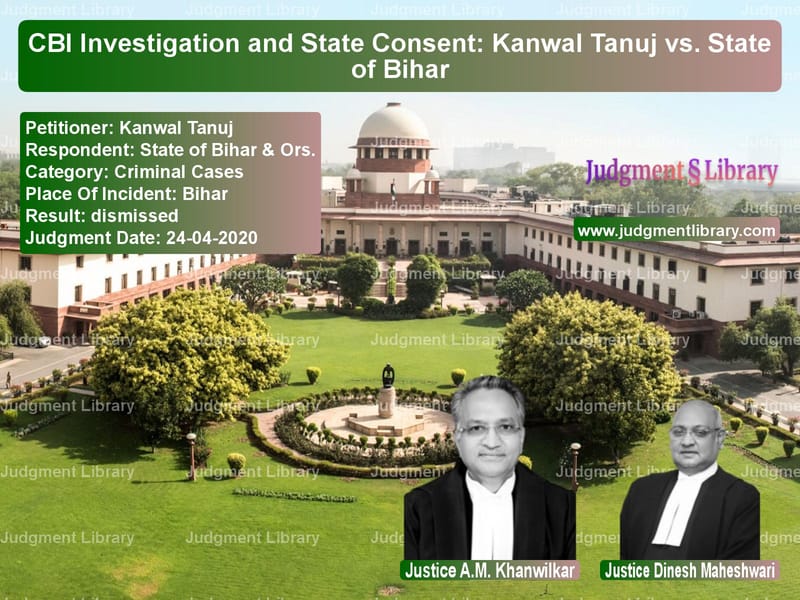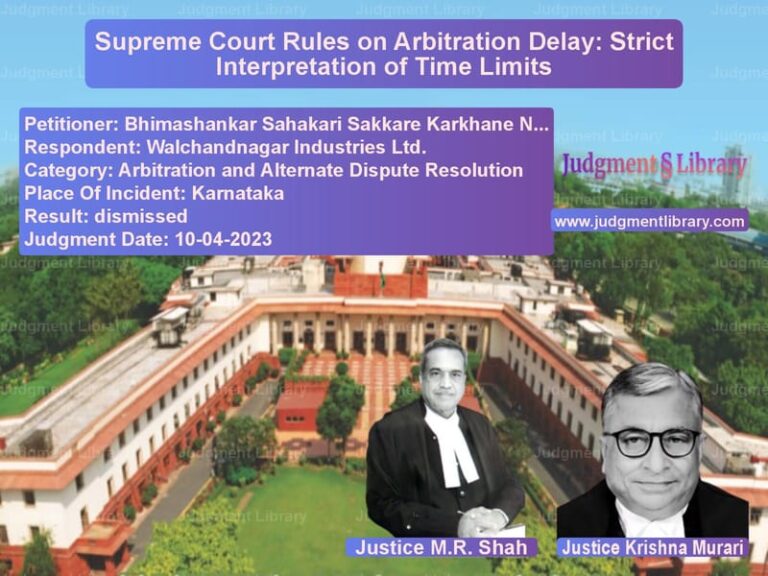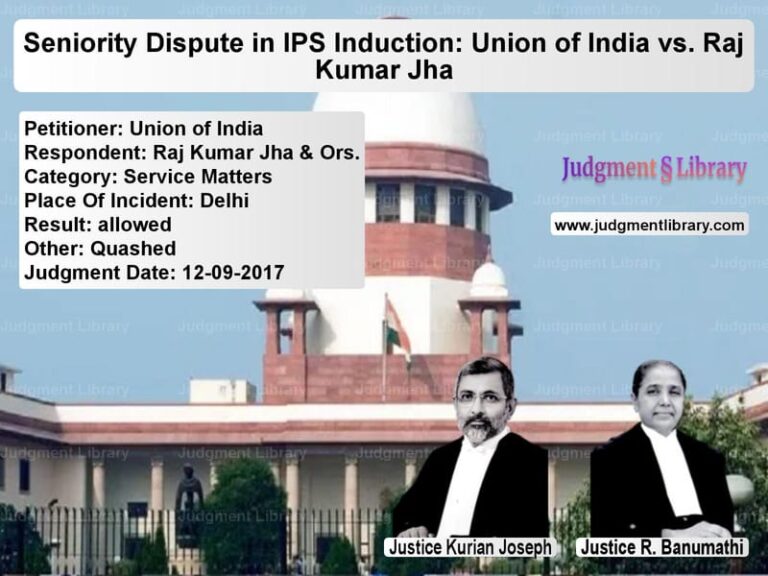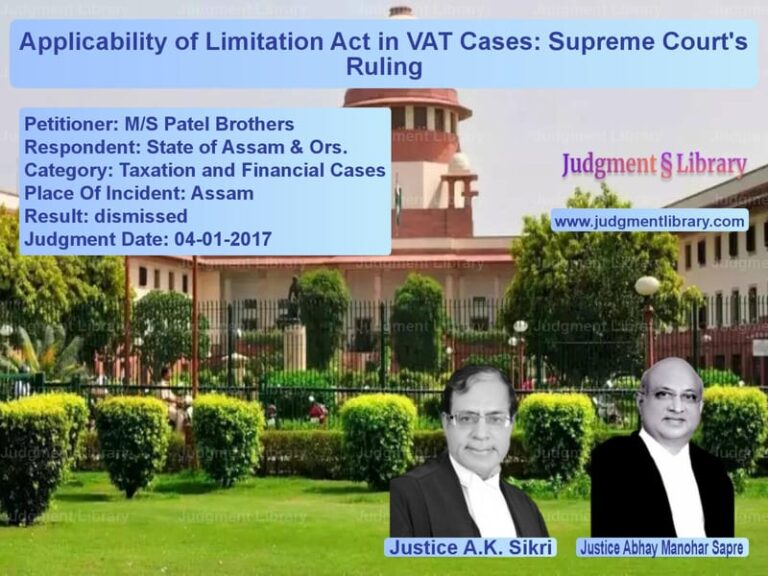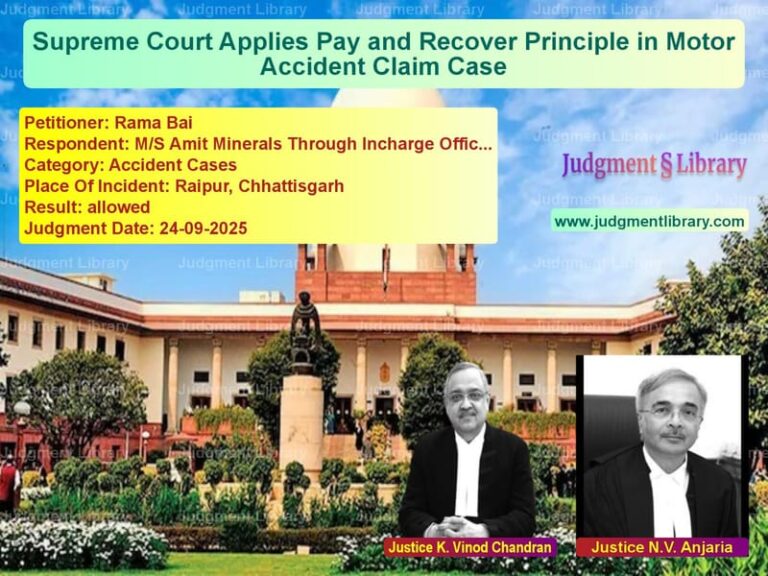CBI Investigation and State Consent: Kanwal Tanuj vs. State of Bihar
The case of Kanwal Tanuj vs. State of Bihar & Ors. revolves around the jurisdiction of the Central Bureau of Investigation (CBI) in initiating an investigation against a state government employee without the prior consent of the state. This case explores the legal framework governing the powers of investigative agencies and the constitutional principles of federalism.
The appellant, Kanwal Tanuj, a senior Indian Administrative Service (IAS) officer serving as the District Magistrate of Aurangabad, Bihar, was implicated in a corruption case involving land acquisition for a power project. The primary contention was whether the CBI could investigate the case without obtaining prior consent from the State of Bihar under Section 6 of the Delhi Special Police Establishment Act, 1946.
Background of the Case
The case originated from an investigation into alleged corruption in land acquisition for the Bhartiya Rail Bijlee Company Limited (BRBCL), a subsidiary of NTPC Ltd. The project aimed to establish a power plant in Nabinagar, Bihar, and required significant land acquisition. Allegations arose that government officials, including the appellant, engaged in fraudulent transactions, inflating land prices and misappropriating government funds.
Legal Issues Involved
The case raised several important legal questions:
- Did the CBI have the jurisdiction to investigate an IAS officer without prior consent from the state government?
- Was the notification under Section 6 of the Delhi Special Police Establishment Act, 1946, applicable in this case?
- Did the alleged corruption amount to a federal offense requiring CBI intervention?
- Were the fundamental rights of the appellant violated due to the investigation?
Arguments Presented by the Petitioner
The petitioner, Kanwal Tanuj, raised the following arguments:
- The CBI lacked jurisdiction to investigate him without the prior consent of the Bihar government, as required under Section 6 of the Delhi Special Police Establishment Act.
- The alleged offenses were committed within Bihar and fell under the state’s jurisdiction, making state consent mandatory.
- The investigation was politically motivated and violated the principles of federalism enshrined in the Constitution.
- The allegations were based on fabricated evidence, and the investigation was launched without proper verification.
Arguments by the Respondents
The State of Bihar and the CBI countered these claims with the following arguments:
- The CBI was investigating a conspiracy involving BRBCL, a government entity funded by the central government, justifying its jurisdiction.
- The offenses alleged included fraud and misappropriation of funds related to a central government project, making it a matter of national interest.
- The general consent given by the Bihar government in 1996 covered this investigation, eliminating the need for separate consent.
- The High Court had already upheld the validity of the investigation, and the petitioner’s claims were legally untenable.
Supreme Court’s Observations
The Supreme Court examined the legal framework governing CBI investigations and made the following observations:
“The power to investigate crimes of national importance must be viewed in the larger context of maintaining transparency and accountability in governance. The absence of state consent does not nullify an investigation that falls within the purview of central government interests.”
The Court further ruled:
- The general consent granted by Bihar in 1996 remained valid, and no fresh consent was required.
- The involvement of central government funds in the BRBCL project justified CBI intervention.
- The investigation did not violate the federal principles of governance as it concerned offenses impacting a central project.
- The petitioner’s claims of procedural irregularities did not hold merit as due process was followed.
Final Judgment
The Supreme Court dismissed the appeal, upholding the validity of the CBI investigation. The Court ruled that the agency had jurisdiction to investigate the matter and that the consent of the state was not required under the given circumstances.
Implications of the Judgment
This judgment has significant implications for the scope of CBI investigations and the interpretation of federalism in criminal law:
- It reinforces the principle that general consent granted by a state remains valid unless explicitly revoked.
- It affirms the authority of the CBI in investigating corruption cases related to central government projects.
- It clarifies the limits of state control over investigations involving national interests.
- It establishes a precedent for determining the jurisdiction of central investigative agencies in corruption cases.
Conclusion
The Supreme Court’s decision in Kanwal Tanuj vs. State of Bihar sets a crucial precedent in determining the jurisdiction of central investigative agencies. It upholds the balance between federalism and the need for transparency in public administration. The ruling reinforces that while state governments retain control over policing, central agencies have the authority to intervene in cases involving national interests.
Petitioner Name: Kanwal Tanuj.Respondent Name: State of Bihar & Ors..Judgment By: Justice A.M. Khanwilkar, Justice Dinesh Maheshwari.Place Of Incident: Bihar.Judgment Date: 24-04-2020.
Don’t miss out on the full details! Download the complete judgment in PDF format below and gain valuable insights instantly!
Download Judgment: Kanwal Tanuj vs State of Bihar & Ors Supreme Court of India Judgment Dated 24-04-2020.pdf
Direct Downlaod Judgment: Direct downlaod this Judgment
See all petitions in Fraud and Forgery
See all petitions in Money Laundering Cases
See all petitions in Judgment by A M Khanwilkar
See all petitions in Judgment by Dinesh Maheshwari
See all petitions in dismissed
See all petitions in supreme court of India judgments April 2020
See all petitions in 2020 judgments
See all posts in Criminal Cases Category
See all allowed petitions in Criminal Cases Category
See all Dismissed petitions in Criminal Cases Category
See all partially allowed petitions in Criminal Cases Category

